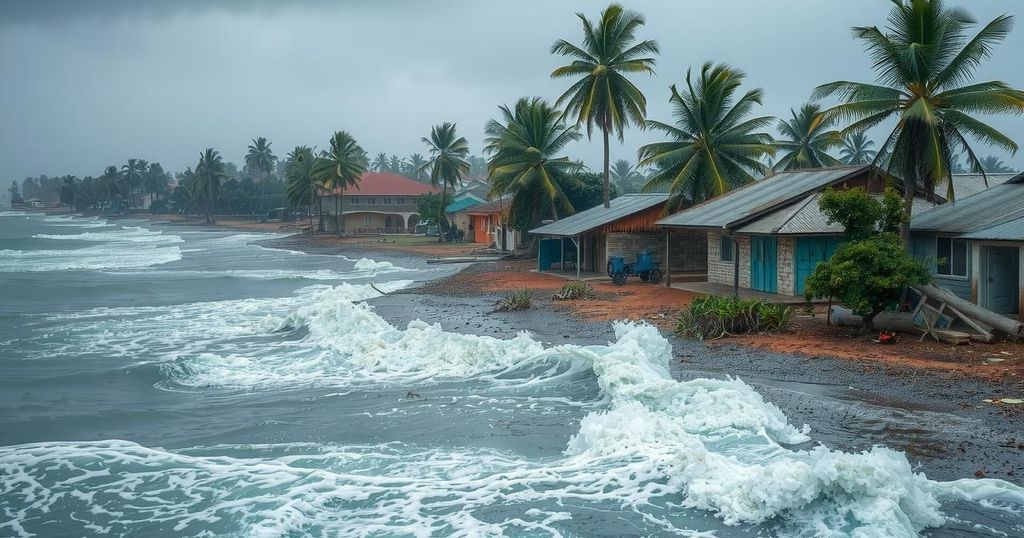Cyclone Chido Devastates Mozambique, Displaces Thousands and Challenges Relief Efforts

Cyclone Chido struck northern Mozambique, causing significant devastation, displacing thousands, and destroying homes and infrastructure across Cabo Delgado and Nampula. UNHCR has initiated emergency relief efforts, providing vital support to affected communities. Preliminary assessments indicate that over 190,000 individuals urgently need assistance, highlighting the ongoing vulnerability of these populations amid a challenging humanitarian landscape in the region.
Tropical Cyclone Chido made landfall in northern Mozambique over the previous weekend, unleashing torrential rains and destructive winds across the Cabo Delgado and Nampula provinces. This catastrophic event resulted in extensive damage to infrastructure, homes, and essential services, displacing thousands of individuals and complicating relief efforts in regions already struggling with significant humanitarian challenges. The UN Refugee Agency (UNHCR) has expressed grave concerns regarding the devastating effects on vulnerable communities and has commenced collaboration with the Government of Mozambique and various humanitarian partners to facilitate immediate aid.
Within a short span of 48 hours post-cyclone, UNHCR responded by delivering assistance to the largest accommodation center in Pemba, the capital of Cabo Delgado, where over 2,600 individuals benefited from vital emergency supplies including blankets, sleeping mats, mosquito nets, and shelter materials. UNHCR is also working to ensure that critical protection services are accessible to the most vulnerable populations affected by this disaster.
While comprehensive assessments of the damages in rural sectors are ongoing, initial findings indicate that approximately 190,000 individuals are in urgent need of humanitarian aid, and nearly 10,000 homes have been reported destroyed. Many villages are left in ruins with minimal structures remaining. The region has faced years of conflict, resulting in forced displacements and economic strife, which have exacerbated community vulnerabilities. For many displaced families, Cyclone Chido has inflicted further suffering, undoing the limited recovery they had achieved.
Prior to the cyclone, UNHCR and its partners had strategically pre-positioned emergency relief supplies and collaborated with the Government to disseminate disaster preparedness messages via television, radio, WhatsApp, and dedicated hotlines. These initiatives have empowered local disaster management teams to cater to the most vulnerable groups. In Nampula, despite some districts experiencing the cyclone’s impact, the Maratane camp, housing over 8,000 refugees from the Democratic Republic of the Congo and Burundi, reported minimal damage, suggesting that recent efforts to improve housing resilience against climate impacts were effective.
In addition to the devastation in Mozambique, Cyclone Chido also struck Mayotte, a French overseas territory, inflicting fatalities and serious damage to infrastructure, posing augmented risks to vulnerable groups including asylum seekers and refugees. UNHCR is actively observing the situation and coordinating collaborative responses with local entities. Meanwhile, southern Malawi also faced the storm’s consequences, with reports of damaged homes and infrastructure due to strong winds and heavy rains, prompting UNHCR to pre-position essential shelter kits to support government-led recovery efforts.
The occurrence of severe weather events, notably cyclones, has become increasingly recurrent in regions like Mozambique due to climatic changes. Cyclone Chido’s arrival follows a series of natural disasters that have historically affected southern Africa, particularly vulnerable communities already facing socio-economic challenges and the repercussions of displacement from ongoing conflicts. The UNHCR plays a critical role in disaster response by providing humanitarian assistance and support to those affected by such natural calamities, particularly in regions where the infrastructure is often ill-equipped to cope with sudden emergencies.
The aftermath of Cyclone Chido illustrates the profound toll that natural disasters impose on already vulnerable populations in Mozambique and surrounding regions. With an estimated 190,000 individuals requiring urgent assistance, UNHCR’s immediate actions highlight the need for sustained humanitarian support and proactive measures to enhance community resilience against future climatic challenges. As the situation develops, continued collaboration among UNHCR, local government authorities, and humanitarian partners will be essential to ensure the effective delivery of aid and protection services.
Original Source: www.unhcr.org






